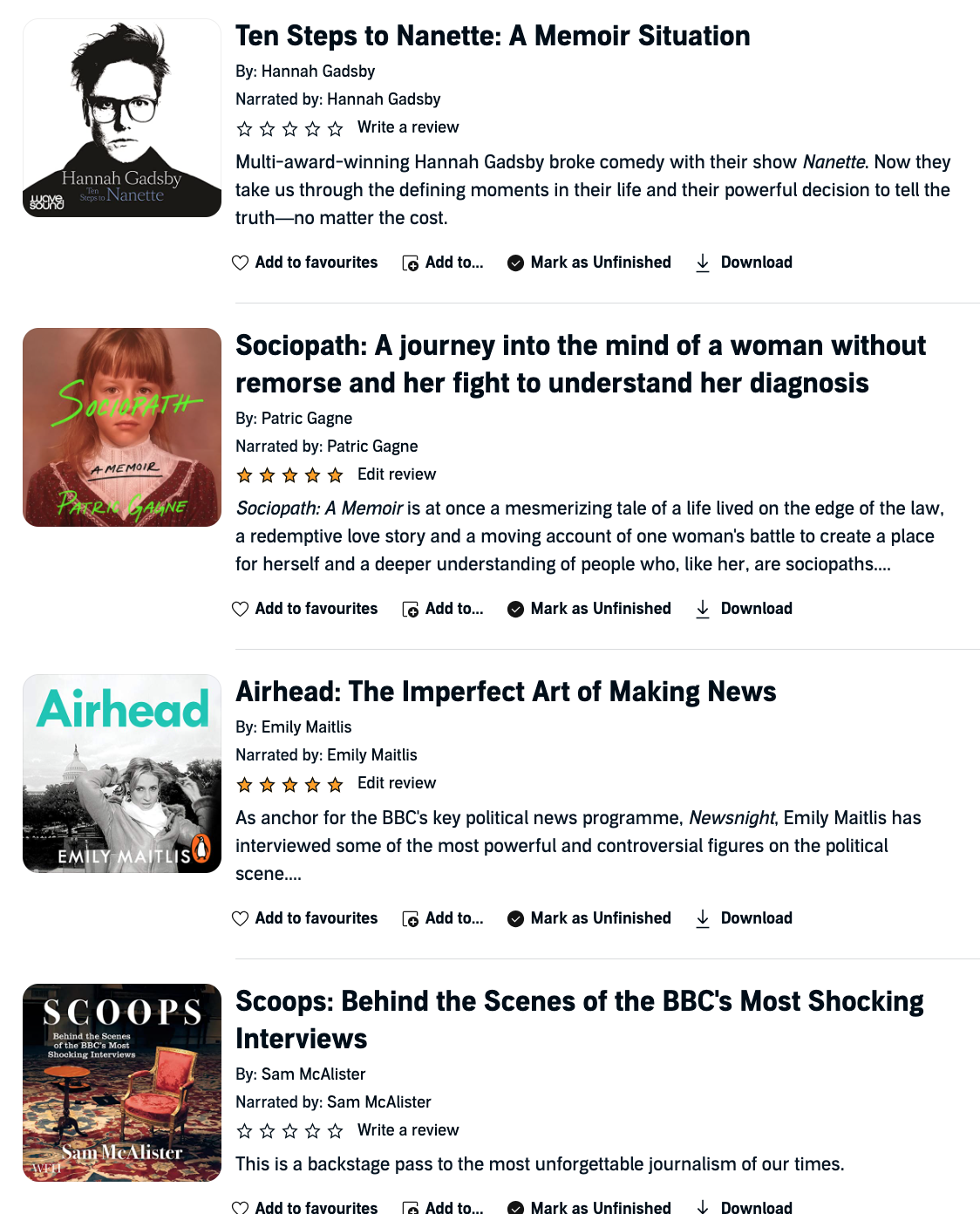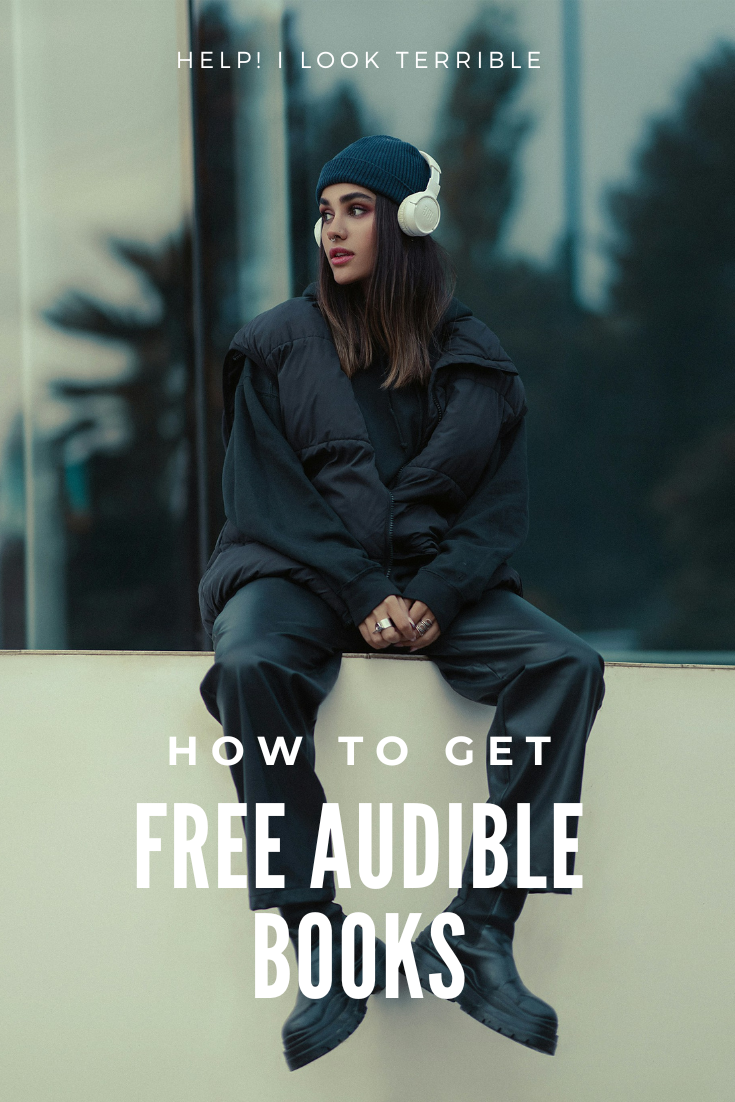Is Audible worth it? How I got 25 free books
I consumed 17 books last year. That’s an increase of 15 books compared to the previous year, and I managed to do it with Audible, and they were free. It was transformative. If you’ve ever found yourself wishing you had more time to read, this post is for you.
In years gone by, I could never find the time to read books because I work at a computer all day and the last thing I wanted to do when I got home was read. My eyes needed a break. I probably consumed the equivalent of a book or two per week at work, but reading for work is very different from reading for enjoyment—purely from a place of personal interest. I held off using Audible for a while because I found the idea of someone reading to me weird, and I didn’t like the subscription model. I have so many books at home that I haven’t read…why would I pay for another?
Three years later, I know exactly why. Because I can pay about $7-14.95 per month to have someone narrate almost any book to me while I do things that I traditionally probably couldn’t do while reading.
Walking to the train station? Listen to a book. Cooking dinner? Listen to a book. Doing the dishes? Listen to a book. Running in the rain? Listen to a book. You get the idea. I managed to fit in 15 audiobooks while doing mundane tasks like walking, commuting and cooking, and I gained a world of knowledge at the same time.
(Note: this post is not sponsored, my love for Audible is genuine. There are some affiliate links, clicking on them is of no extra cost to you, it just helps keep my site running :)
How to get free books on Audible
Get an Audible Premium Plus membership that gives you free credits. This is explained below.
I downloaded Audible with a 30-day free trial, listened to the first book in The Wheel Of Time series while I recovered from wisdom tooth removal, and then I forgot about it altogether. I didn’t like the book at all (sincere apologies to those who love it, I really tried) so I didn’t feel the need to race back to Audible and listen to the next 13 novels in the series.
I’m not sure how long I had the subscription for before I cancelled it, or what the deal I signed up for was, but it must have been a good deal and I must have been on it for a while because I suddenly had about 25 free audiobooks to claim. Some Audible plans come with monthly credits that allow you to buy any book in the catalogue, regardless of the cost. At some stage, I’ve realised I was paying for Audible and cancelled the plan, but I kept getting emails telling me I had unused credits.
When I downloaded the Audible app again and checked my account, I realised I had 25 unused credits. I didn’t want to sign up for Audible again, but that didn’t seem to matter—I could buy 25 audiobooks, free of charge, without signing up to a plan.
Of course I did initially pay for the subscription but, if you’re not on a subscription plan, audiobooks do generally cost the same amount as paperback books because there’s a whole production process involved—there’s a professional voice actor or narrator, they’re often recorded in studios with sound mixers, and sometimes there’s background music.
I’ve managed to listen to more than $1000 worth of audiobooks with credits alone, and I definitely didn’t spend anywhere near that on my subscription.
Audible free trial and membership
Audible will give you 30 days free, or $0.99 per month for three months. During that period, you can listen to however many books you like. Plans start at $7.95 per month after the free trial.
From there, you have options.
Audible Plus: $7.95/month means you can listen all you want to thousands of titles.
Audible Premium Plus: $14.95/month includes thousands of titles plus one credit per month for any premium selection title.
Audible Premium Plus Annual: $149.50/year includes thousands of titles plus 12 credits a year for any premium selection titles.
Any book you actually buy, with a credit or cash, is yours to keep. You can’t keep books that are downloaded with your subscription benefits.
You can probably do some math here to work out what the best value is for your lifestyle and how often you’ll use it. I listen for a little over an hour per day, so the $7.95 plan works for me. I don’t need to keep them once I’ve listened to them, so I don’t mind that I might lose access to them if I cancel my membership. A friend of mine listens all day while she works, so the annual subscription is worthwhile for her.
I do think the 12 credits in the annual plan is a great deal because it gives you 12 free audiobooks per year. If you get this plan through Google Play or App Store, these credits will not expire, even if you cancel your Audible membership.
A common question is whether Audible is included with Amazon Prime. Sadly, it is not—it’s a separate subscription.
Do Audible credits expire?
It depends on your plan, and how you signed up for Audible. Some plans have credit limits that expire once the billing period rolls over. But if you get them through the app, they will not expire even if you cancel your subscription.
Pictured below: Some of the books I got free, using credits. I highly recommend them all. They’re mine to keep because they were purchased using credits.
How does Audible work?
Audible is really easy to use. Download the app, sign in with your Amazon account and get a free trial. Search for a title you want, download it, and you’re good to go.
I find audiobooks download quickly on my phone using wifi, and you can start listening even before it finishes downloading. You can also choose to buy an audiobook with credits.
What I loved, and what I didn’t
Through this Audible journey, I learned I don’t like listening to fiction. I much prefer reading it. After The Wheel Of Time, I tried Dune, and I even tried something completely different by Margaret Atwood. But no. I don’t know if fiction is too slow in audiobook form, but it’s not for me.
What I love listening to is non-fiction. I largely listen to biographies by people who have lived very different lives to me—Unfollow, Wavewalker, Sociopath, and What My Bones Know were all excellent. They were read by the authors, which I prefer because their tone is crystal clear—you know exactly how they speak, and the tone of all the characters in their lives. Louis Theroux and Jennette McCurdy were especially good at this. Sometimes you also get extras in an audiobook—Louis Theroux had a whole section at the end of Gotta Get Theroux This that isn’t in the readable version.
I feel as though I’ve gained valuable knowledge about the power of religion, trauma, mental health, and travel that I wouldn’t have otherwise had. If I had those physical books on my shelf, I know I wouldn’t have finished them.
Audiobooks are as beneficial as reading
The act of listening to an audiobook is not the same as the act of reading, but it’s still the absorption of information and it activates similar brain regions to reading. It can improve cognitive processing, and language comprehension.
Researchers analysed brain scans and found that stories stimulate the same cognitive and emotional areas, regardless of the way they’re delivered. Whether you’re reading print books or audiobooks, you’re still absorbing information effectively (as per The Journal of Neuroscience).
Personally, reading books is important to me because I aim learn, rather than to improve my comprehension skills. If you want to improve your reading skills or your attention span, picking up a physical book might be the way to go. I recommend Kindle for that—you can have 500 books in your pocket at all times, and they are significantly cheaper than physical books. It’s amazing.
No matter how you decide to consume books, being open to new information is never a bad idea.






